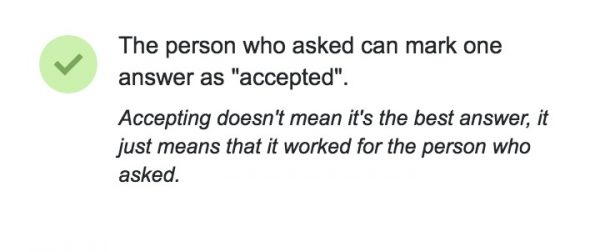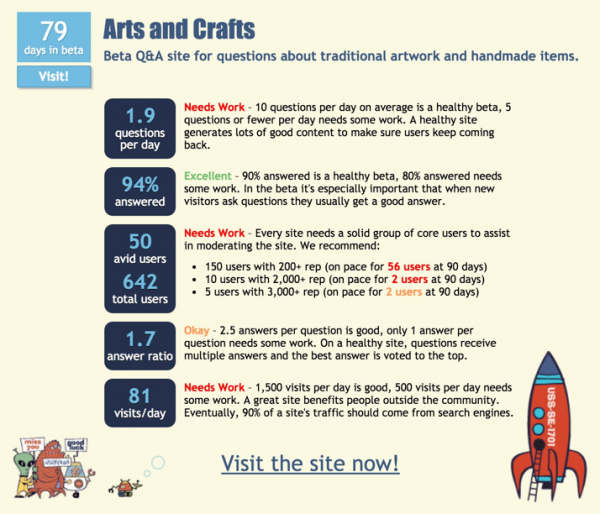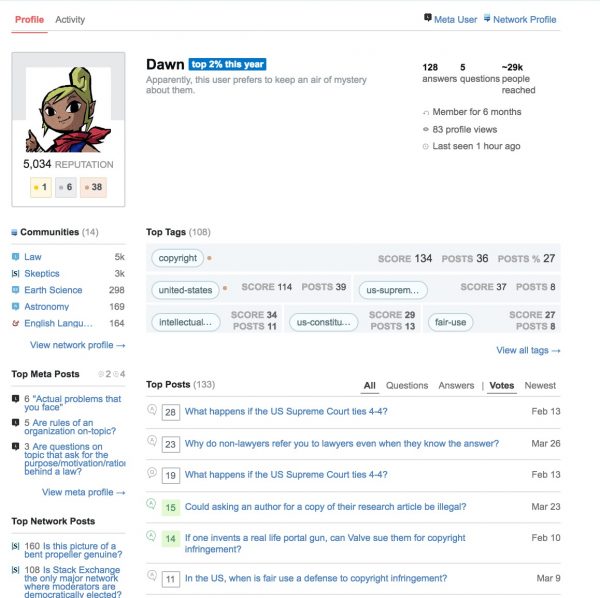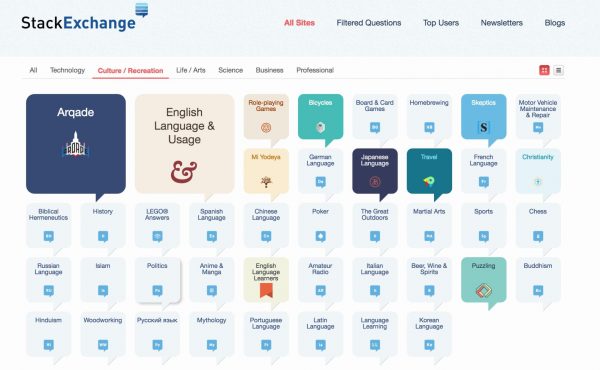Note: This was drafted as a document to outline an idea to be presented to the Creative Commons organization. The idea for a Stack Exchange came originally as an idea to add a component of participation / service for the CC Certification Project. It seemed limiting to make this solely for this project, that it would serve a greater good for CC as a whole.
One driver for the project itself, as I understand it, is as a small organization, dealing with the large number of queries they get (see below for some stats on the volume)… the best way to deal with it is to increase the awareness and understanding of Creative Commons and to make a place where a community itself can answer questions in a way that adds to a body of knowledge.
If it is any small indication of a need for this, since sharing my role in the project via this blog and twitter, I have gotten more than a handful of direct contacts from colleagues asking very specific license “what if?” questions, as if being associated with Creative Commons makes me some kind of oracle… these are questions I am not even comfortable answering.
But more so, questions answered in emails, in direct messages, in IRC, are lost bits of knowledge.
A lot of my thinking is and continues to influenced by the ideas of Mike Caulfield, especially his recent ideas on Choral Explanations.
A Creative Commons Stack Exchange Community would serve as a place for people seeking Creative Commons Certifications can demonstrate their proficiency by practicing asking, answering, rating, and commenting on relevant questions.
Furthermore it could provide a public resource for the organization in conjunction with the current available avenues of FAQs, email, and IRC as ways for people to get answers to questions on using Creative Commons.
Pros
- All information on Stack Exchange is publicly viewable, and licensed under a CC-BY-SA license; e.g. no login is required to benefit from site (see Creative Commons Case Study on Stack Exchange)
- If accepted as a community, it is a hosted service, at no cost (no technical support required by CC staff)
- Provides a rich gauge of community and individual activity
- Reputation / point system as encouragement
- Focus on answers, not debates.
- Robust API that could be used potentially in conjunction with a credentialing system such as Credly
Cons
- Long process for application, review, need to garner support from active Stack Exchange users
- An environment CC would not “control” (the community of participants does)
- Can be an intimidating, not intuitive environment to new users, and unfamiliar even to those experience in online communities
- Some SE communities are harsh, hostile on judging relevant questions, some say it is controlled by trolls
- Gender imbalance common in some communities
What is Stack Exchange?
Stack Exchange (http://stackexchange.com/) is a network of 157 “communities” of Question and Answer sites– from Wikipedia:
Stack Exchange is a network of question and answer Web sites on topics in varied fields, each site covering a specific topic, where questions, answers, and users are subject to a reputation award process. The sites are modeled after Stack Overflow, a Q&A site for computer programming questions that was the original site in this network. The reputation system allows the sites to be self-moderating. User contributions are licensed under Creative Commons Attribution-ShareAlike 3.0 Unported
The original Stack Overflow site was developed by Joel Spolsky and Jeff Atwood in 2008 as an alternative to other question and answer sites that were private or required registration. Unlike more familiar community online forums, discussion boards, Stack Exchange focuses primarily on community producing answers to questions. Questions and answers are upvoted and downvoted by its community, and a reputation system based on activity, comments provides a way for the community to develop it’s own moderators.
See A Theory of Stack Moderation for more on the roles of community moderators.
As described in the Stack Exchange tour built into all communities (e.g. a tour for bicycle stack exchange, is similar to the one for WordPress development, and cooking):
We’re a little bit different from other sites. Here’s how:
Ask questions, get answers, no distractions
This site is all about getting answers. It’s not a discussion forum. There’s no chit-chat.
https://www.youtube.com/watch?v=bvEAuSHJOBU
In a 2015 talk to the Wikimedia Foundation, Spolsky emphasizes that the audience for a Stack Exchange community is not the active core participants, but the larger internet audience who find answers to the questions via results from web searches (Stack Exchange is noted for it’s high placing in web search results).The goal is not to produce an authoritative answer:

According to a Wired interview with Atwood, Stack Overflow’s goal wasn’t just to have “good” answers or help developers solve technical problems.’ “A programmer’s job is to communicate with users to find out what people want,” he explains. “We’re tricking developers into being better communicators.” By making developers better at the non-technical aspects of programming, Atwood hopes Stack Overflow can make the internet better for everyone.’
Mike Caulfied has recently described this approach as “choral explanations” describing the talk by Spolsky:
And in his Wikipedia talk he mentions that when “active editors” were defined in comparable ways, Stack Exchange (founded 2010) had actually surpassed the number of active editors found on English Wikipedia (founded 2001). And unlike English Wikipedia, Stack Exchange was still growing.
Sites like Quora and Stack Exchange turned this process on its head. Instead of envisioning the Q&A site as a single-purpose forum, the new breed of Q&A site sees the model as half-wiki/half-forum. The question asked is analogous to the title of a wiki page; it’s not transactional but communal. A question like “How can a person increase their chances in the lottery?” is the place where the community will store their collective knowledge on that point, and it is not owned by the person who asked the question, but by the community itself.
Much activity and sometimes controversy revolves around what is an acceptable question- the stated intent of a community to become an expert community.
To attract experts, you need a site where people are asking very interesting and challenging questions, not the basic questions found on every other Q&A site. Your goal is to make it clear that this is a professional site.
Questions are encouraged to be about “actual problems” not opinion-based or ones meant to stimulate discussion or debate. The guidelines for proposing a community offers these suggestions for developing that style of site:
- Ask real, expert questions. We want you to capture the moment that plumbers feel when they look at Plumber Overflow and say, “Whoa! That’s my kinda site!” On a site about plumbing, there are 200 easy plumbing questions, and they’ve all been asked 100 times on other sites. Don’t suggest questions like “How do I unclog a drain?” Instead ask, “If you run 2.5 GPM through 50 feet of 1/2? galv pipe, how many psi will be lost to friction loss?” Remember, pro sites WILL attract the enthusiasts, but not the other way around!
- Ask questions that can be answered. Avoid asking questions that are subjective, argumentative, or require extended discussion. Stack Exchange does not work well with questions like “Which is the best…”
- Off-topic questions are important, too. If you have a good, useful question in mind, but aren’t completely sure that it’s on topic, ask it anyway; others can then discuss the subject and together determine if it is appropriate for the site. Questions that simply don’t fit in the scope of the site should be closed, indicating that, while perhaps interesting, this topic is inappropriate for this site. This helps to define the very outer boundary of a site.
Questions are “closed” by its moderators when considered answered, or they can be deemed “non-constructive” but the person who proposed such a question is encouraged to edit to make the question more concrete:

The technical communities can be critical to outright hostile to general users, as pointed out in The Decline of Stack Overflow:
Not only is Stack Overflow plagued by overzealous trolls, but it is a community where the trolls are actually in charge. No wonder hostility and infantile behavior have become the very norm that define one’s experiences at Stack Overflow! Clearly, no one is watching the watchmen.
The game mechanics can serve as more of a goal for people to improve their status than to provide useful answers. Also, an academic study found a large gender imbalance in the StackOverflow community; see Gender, Representation and Online Participation: A Quantitative Study of StackOverflow
These characteristics might be more extreme in the larger established spaces of the technical topics– they seem to not be as prevalent in other topics communities.
Why for Creative Commons?
For the purposes of the Certification, participation in a Stack Exchange would provide an active, measurable component of activity. This could be via posting questions from their own domain, experience, participating in answering, and commenting, as well as upvoting. All of this can be demonstrated via a profile link, and used in a system we create via the Stack Exchange API. As an example, here is one profile, with impressive detail:
In fact, Stack Exchange offers an impressive, and open access, to data activity within a community, see for example the Law community http://law.stackexchange.com/users This is part of a data system that extends across Stack Exchange Stats for whole ecosystem (Data Explorer) http://data.stackexchange.com/ and per site:
Stack Exchange includes tools for creating custom data queries to create metrics for any kind of activity in a community, for example http://data.stackexchange.com/wordpress/query/785/how-many-upvotes-do-i-have-for-each-tag
On a larger front, a Stack Exchange potentially could become a vital resource for questions and answers about Creative Commons. The current methods for providing answers include:
- FAQ: An extensive FAQ but also… well extensive, one large document. Commonly heard “people are too lazy to look things up”
- Email: An email address answered by staff in Freshdesk software. This is lost knowledge, as only the person who asked the question sees the answer. From the CC staff member that manages the email account “Volume 900-1000 questions per month, some is spam Tickets go to finance, tech, legal, to development but 90% are for requests for info. ~75% (approx) could have been resolved if user looked for answers in FAQ or elsewhere on website.”
- IRC channel: (~3-6 questions per week, estimate from CC staff)– Again, questions are ones often repeated, and the answer is not readily made visible
Stack Exchange sites were designed to provide this kind of question/answer service in a way that makes the results easily discoverable (popular votes, results on google search), but also makes them more public than current approaches. Furthermore, a Stack Exchange community becomes one that answers the questions itself, and quickly, reducing demand on CC staff.
Sampling of Stack Exchange Communities
The most active and prominent Stack Exchange Communities are in the technical realm for which it was first developed but worth noting is the variety of topics, for example in the Culture/Recreations category:
A sampling of the types of questions and examples of depth / breadth of responses:
- Scientific Skepticism community Does Netherlands accept child marriages registered in the country of origin?
- Bicycles community Crack in frame near forks
- Travel community What is the purpose of the odd sticker in a new British passport?
- Music Practice and Theory Community Why are there only five diatonic scale forms if there are 7 modes? not including hypo- modes
- Earth Science Community How and why did the oceans form on Earth but not on other planets?
If it is any measure of the prominence of Stack Exchange in Google search results. While pasting in the title of all of these questions into a Google Document, highlighting the text, the link suggestion always points to the Stack Exchange link:

The most comparable existing Stack Exchange Community is the one for Law “Q&A for legal professionals, students, and others with experience or interest in law” — note the sidebar disclaimer :

This community already deals with legal aspects of copyright and licenses:
- Are stock quotes and related trade data protected by copyright or any IP law?
- Use of CC0 images in an Android app
- How does a US company sue a German company for copyright infringement?
- Is it legal for IEEE to sell Creative Commons content?
- Could it be considered fair-use to post a censored version of another YouTube video on YouTube?
- Are tweets or Instagram posts copyrighted?
- Copying HTML: copyright violation?
Note that the use of tags in questions and other search logic provides a sidebar on each community page that offers links to related questions, with indicators for more relevance:

The other one that might potentially overlap with this proposal is the Open Source Stack Exchange (currently in a public beta stage) “for people organizing, marketing or licensing open source development projects”. At the time of writing, there are 59 questions tagged creative commons including:
- Why is YouTube using 3.0 version of CC BY?
- Is a government organisation commerical or non-commerical?
- Using CC Attribution-Share Alike 3.0 Unported image in a book
- Relation between the creative commons license and the patent process
- Can Wikipedia content be used on my website if I attribute it on my terms and conditions page?
Their on topic page indicates broad coverage for their community:
Open Source Stack Exchange is a question & answer site about a group of related movements which encourage people to give up some of the rights given to them by copyright law, by using licenses which give others the freedom to use and transform their creative works, and which optionally (by using copyleft/share-alike licenses) ensure that these works will always be made available with the same rights. This site is not limited to software, but also covers art, literature, hardware, databases and more.
But it does indicate ways in which a community can signal their relationship to other possible ones that are complementary.
A proposal for a Creative Commons Stack Exchange Community would have to make it clear how it’s focus would be unique compared to the legal aspects of the Law Community and the Open Source developer perspective (perhaps by a focus on user of CC content?)
Submitting a Proposal for a Creative Commons Stack Exchange
Stack Exchange does not charge fees for hosting a community, new ones are added through the Area 51 Staging Zone “where users come together to build new Q&A sites. New site ideas are proposed, discussed, and the best go on to beta.”
The process can take months:
- Proposal: A new site is proposed by defining the topic, five sample questions, and recruiting a “critical mass” of experts to participate
- Definition Phase: “A good Q&A site needs a lot of people to support it, so users are asked to invite their friends and help build the community. Continuous participation is really, really important because each phase of the proposal has different ways to get involved”. A topic is considered “Defined” when it accumulates 40 questions that have ten net votes (upvotes – downvotes).
- Commitment Phase: A petition for the site is sent to the Area 51 Community- the formula for achieving commitment is based on numbers of users with certain reputation points normally 100 people with at least 200 reputation points. The proposer also needs to be active in the community (asking/answering questions).
- Beta Phase: The community goes live ‘on a “probationary” basis to see if people use it. It is very important to participate early. The earliest questions set the tone and topic of the site for a long time. This is also the time to spread the word via Twitter, blogs, and email far and wide. If the site does not get used, it will be deleted.’
A report card for the Arts and Crafts beta community indicates the measures sought to “graduate” to full community:

Implications for Applying to get a Creative Commons Stack Exchange
- Creative Commons is well known, e.g. the fact that a CC license is attached to all Stack Exchange content
- The proposal will need to make a case for how it is different or should not be part of the Law community. This would mean explaining its broader reach than legal questions, but also social/cultural, as an education resource, addressing the methods and ideas of attribution, the questions and values of remix culture.
- It will take months to accomplish and regular effort to recruit and engage participation
- This would require backing of concept and participation from CC organization; it is much larger than the certification project
- A successful Area 51 process hinges on support from people with sufficient Stack Exchange reputation points– do we have people in the organization who are active here? Can we recruit people who do have this status? Can we quickly build our own status?
- How can we keep the barrier to asking questions low- e.g. not make it intimidating, how to create a positive culture (the technical communities can be harsh to new people)
For the seed questions, the staff member who manages the email question address provided a 7 page document with a selection of recent questions sent to the CC email address we might consider for the Proposal / Commitment phase. The goal is to find ones that represent “real expert” questions, ones that are not seeking an opinion (“why is CC-BY-SA better than CC-BY-NC”), e,g,
I have a faculty member that would like to create PowerPoint slides for her courses based on a textbook that is licensed with a CC BY-NC-ND license. Would she be allowed to do this since she is not changing the textbook itself, but creating a new resource that incorporates information provided in the textbook while attributing the source of the information to the text?
Our team is currently discussing under which licence we should publish anonymized result of a survey. If we publish the data under CC-BY-SA and someone creates a visualization of it and uses it in a paper/webpage, is he only obliged to licence the visualization of the data or the whole paper/webpage under CC-BY-SA?
I found some nice photos on Flickr (USAID) – photos that are in the Public Domain https://www.flickr.com/photos/usaid_images/16017269983/ I am a freelance translator and was interested in using two small photos to illustrate my Website (I have one page in English and one in Frenc on International Development www.ochanine.com The photos in question have the symbols with a human form and a crossed out $ symbol. I understand that these photos are in the Public Domain but not for commercial usage. Could you tell me whether usage on my Website would qualify as “Commercial Usage”? The person I contacted at USAID was unable to answer this question but I don’t know how to interpret this otherwise.
I am using a graphic (https://commons.wikimedia.org/wiki/File:Interaction-Design-Disciplines.png) in a book chapter (not open licensed). I’ve modified the graphic (see attached). Do I need to include the originator’s information at the base of the graphic or can I remove it?
Recommendation
It would be an interesting and more modern, web-native approach knowledge management to create an active Stack Exchange community, and would be worth initiating the process in Area 51 and watching how it progresses. We will need to have an active contributing group of participants to see the test site with content and activity, preferably from individuals with some level of Stack Exchange reputation points.
Because it would take months to earn an established Stack Exchange Community, and because we cannot count on it, we should also in parallel develop an alternative space. These would be all options where we have more “control” but also must be supported by CC tech staff.
Suggestions include:
- Discourse “Civilized Discussion: free, open, simple” an open source platform developed by Stack Exchange co-founder Jeff Atwood has many worthy features including a trust system, community moderation, mobile ready, an API. It is more of a conversation space; it lacks up/down voting, but participants register approval with Likes. This would require technical support and hosting from CC.
- Question2Answer a free and open source Q&A platform modeled after Stack Exchange, one of the more popular platforms (PHP/MySQL) running on over 19,000 sites in 40 different languages. It can be used in conjunction with a wordpress site and/or it’s user database so it could be connected to a “Activity Bank” and/or the CCID user system.
- WordPress Q&A plugin a premium plugin that is part of the WPMUDEV membership ($49/month).
Featured Image: Remix of flickr photo by Joe Crawford (artlung) https://flickr.com/photos/artlung/6473087601 shared under a Creative Commons (BY) license with adding a Creative Commons logo and a screen shot of this web site.





Discourse even developed a plugin to mark a comment as “solved” https://github.com/discourse/discourse-solved. In thinking of the DIY options I’m particularly interested in experimenting with Discourse as an alternative to your own StackExchange community.
That’s on my possibility plane too. The connection via Jeff Atwood makes discourse a sort of distant nephew of Stack Exchange. But it’s also about discussion, I’m intrigued by the focus of Stack Exchange on answers, not back and forth discussions (or shuttling that off to meta). And while it does have favoriting and some sorting, it’s not quite the focus of up/down vote.
I like discourse a lot (and thanks to Reclaim I have only needed to admin it not run it, yay!), though it seems sometimes to be too many things happening at once– my approach has been as much to simplify.
I’m not 100% sold on Stack Exchange, and I’m not even sure we can get through the Area 51 approval process, so that’s why I am thinking of a plan B.
Are you aware of the Open Source Stack Exchange community at http://opensource.stackexchange.com/? It’s not dedicated exclusively to Creative Commons, but does include CC. Things that are on-topic there include the history and philosophy of open-source organizations, how to understand and use free and open licenses, how open source projects are created and executed, and what licenses should be used in a specific situation (http://opensource.stackexchange.com/help/on-topic).
They already have 59 questions tagged creative-commons (http://opensource.stackexchange.com/questions/tagged/creative-commons), and more with related tags for specific CC licenses.
Thanks Thomas, I’ve seen the Open Source Stack Exchange but had missed going in deeply, the the on topic page is really solid on defining its scope.
I was trying to be aware of possible overlap with the Law community, and will include now the Open Source one, and aim to make ours a complementary one was well, more focused on users, re-users. remixers of CC content in sectors outside of tech (educators, librarians, museums, government, not-for profits). We appreciate any advice and hope we can get support from the Open Source community too.